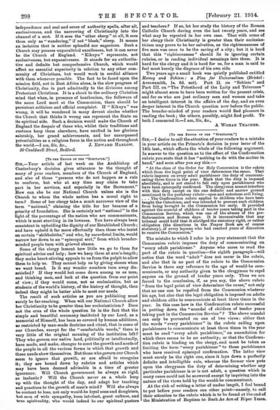(To 2117 ED770s 07 787 ..S7707■70/..]
HIR,—Your article of last week on the Archbishop of Canterbury's decision gives utterance to the thought of many of your readers, members of the Church of England, and also of those "persons who do not happen as a rule to conform, but who at any time may claim to take part in her services, mid especially in the Sacrament." How can she be our National Church unless she is the Church to whom the whole nation has a moral right to turn? Some of her clergy take a much narrower view of the term "national," claiming the title for her because of a priority of foundation. She is certainly not "national" in the light of the percentage of the nation who are communicants, which is most startling in its lowness. You have always been consistent in upholding the dignity of our Established Church; and have upheld it far more effectually than those who insist on certain "shibboleths," and who, by sacerdotal limits, would narrow her down to an "episcopal sect," from which broader- minded people turn with grieved shame.
Some of the clergy lament how little we go to them for spiritual advice and help ; how we keep them at arm's-length; they make heart-stirring appeals to us from the pulpit to allow them to help us. They cannot help us by giving stones when we want bread. Is it any wonder numbers turn away dis- satisfied P If they would but come down among us as men, and thinking men, and look at -the question from our point of view; if they would come, not as ecclesiastics, but as students of the world's history, of the history of thought, then indeed they might be better able to meet our needs.
The result of such articles as you are publishing must surely be far-reaching. When will our National Church allow her Christianity to be greater than her ecclesiasticism P Does not the crux of the whole question lie in the fact that the simple and beautiful ceremony instituted by our Lord, as a memorial of Himself, has been so covered by human additions, so restricted by man-made doctrine and ritual, that in some of our Churches, except for the "comfortable words," there is very little of the original meaning of the institution left P They who govern our native land, politically or intellectually, have made, and make, changes to meet the growth and needs of the people in all the various forme in which that growth and those needs show themselves. But those who govern our Church seem to ignore that growth, or are afraid to recognize it; they are bound down by rubrics and articles which may have been deemed advisable in a time of greater ignorance. Will Church government be always so rigid, so inelastic P Will the Church never as a whole keep up with the thought of the day, and adapt her teaching and practices to the growth of man's mind P Will she always be content to lose, not only would-he loyal sons and daughters, but men of wide sympathy, keen intellect, great culture, and true spirituality, who would indeed be our spiritual pastors
and teachers P If so, let her study the history of the Roman Catholic Church during even the last twenty years, and see what may be repeated in her own case. That with some of her clergy their Christianity is greater than their ecclesias- ticism may prove to be her salvation, as the righteousness's of five men was once to be the saving of a city ; but it is hard that this " righteousness " should lie in ignoring certain rubrics, or in reading individual meanings into them. It is hard for the clergy and it is hard for us, for a man is said to feel most keenly the disgrace of his own side.
Two years ago a small book was quietly published entitled Heresy and Schism : a Plea for Universalism (Bristol, Arrovrsmith, la 6d. net). Part U. on "Schism" and Part III. on "The Priesthood of the Laity and Tolerance" might almost seem to have been written for the present crisis, and for us who are just ordinary men and women and take an intelligent interest in the affairs of the day, and an even deeper interest in the Church question now before the public. The broader-minded of your readers would find pleasure in reading the book ; the others, possibly, might find profit. To both I commend it.—! am, Sir, Ste., A WOMAN TEACHER.














































 Previous page
Previous page